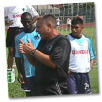The Essence of Sport
Coaching and true amateur sports are very special. Away from the media and the glare of publicity there are so many opportunities to reach young men and women and be a factor in their lives. Enjoy this this article from the January 16, 2005 New York Times, this is what sport and coaching should be!
The Philosopher/Coach
| |
YEARS ago, it was not unusual for an English professor to coach the high hurdlers on the track team. Today, the professor/coach is a rara avis. Coaching has become a highly specialized field that requires a year-round commitment to recruiting and training and leaves little room for amateur enthusiasts.
In the book ''The Game of Life: College Sports and Educational Values,'' William G. Bowen and James L. Shulman argue that at every level of college sports, athletes are finding it harder and harder to swim in the world of ideas, in part because they live in an athletics subculture that undervalues education. A strong antidote to this trend, they say, is to integrate athletics into the educational mission of the school.
Who better to assist in this effort than coaches drawn from the teaching faculty?
I experience the growing gap between athletics and academics whenever I tell fellow faculty at
And yet, the afternoons that I spend on the practice field open pathways to the minds of students who might have otherwise remained a blank to me. Last season, a senior defensive back came up to me during warm-ups and asked if I had read the novelist Chuck Palahniuk's latest book, ''Stranger Than Fiction: True Stories.'' I confessed that I hadn't but promised to look for it.
As I started loosening up for the drills I would soon be running, tossing the ball back and forth with one of the players, the defensive back, using my football nickname, asked, ''Diesel, was Jesus a philosopher?''
Catching a ball at my knees, I replied, ''Philosophy is the business of providing arguments, and since Jesus did not offer arguments for his positions, he was not a philosopher.''
A wide receiver chimed in, ''Yeah, Jesus just told you what to do and that was it.'' And the d-back asked about the miracles.
''Miracles are not an argument,'' I responded. ''The power to do special things does not mean that your views are necessarily true.''
My interlocutor looked off for a moment and then said, ''But what matters is the truth, and Jesus is the truth.''
With a gentle shove, I offered, ''Hey, you asked me if Jesus was a philosopher!''
Were it not for this time together on the field, I am not sure that young man would ever have invited me to play intellectual backyard catch with him.
In every college class sit some students who do not utter a peep. It is all too easy to get the mistaken impression that their silence is an echo of the emptiness of their inner lives. Yet walk the sidelines with some of these student athletes and they open up and offer a glimpse of the complex landscape of their minds.
Coaching also gives me an opportunity to push and prod students. Two years ago, I had a veritable bench-full of athletes in an introductory philosophy class. A couple of them were sinking fast, so I buttonholed them and, in terms more blunt than I might have used with other students, warned them that their grades were heading south, and fast.
I then delivered one of my better academic pep talks, explaining that there is a knack to doing philosophy that is not unlike developing a shifty move on the field. I also promised that if they came in and worked with me every day for 15 or 20 minutes, they would catch on. Because we trusted one another, they dutifully trudged into my office every day for some mental gymnastics.
And so they learned how to construct arguments well enough to avoid the failure that was building up early in the semester.
IN their mission statements, many colleges talk about educating ''the whole person,'' yet they often deploy the faculty as though there is one group for the mind and another for the body.
Is it any wonder, then, that many athletes find it difficult to integrate their intellectual and athletic pursuits? The professor/coach, one foot in each world, can bridge these worlds, a point driven home when I walk across campus and one of my players shouts, ''Hey, Coach Diesel, what are you teaching next semester?''
Gordon Marino is an assistant football coach and holds the Boldt Distinguished Chair in the Humanities at St. Olaf College in Northfield, Minn.


1 Comments:
Fantastic article!
I know many graduate students who turn to athletic pursuits to work of the cognitive stress of academics. Both athletics and academics require a great deal of hard, grinding work.
Also, the professor/coach seems like a great dual role, because similar mentoring skill are necessary to do well at both.
Bonnie
Post a Comment
<< Home